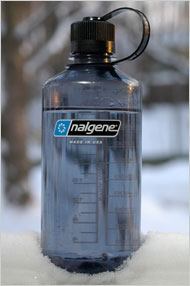 Last week I wrote about a study that revealed interesting clues that may help us to understand why synthetic estrogens, including Bisphenol-A (BPA), found in many widely-used plastics, have a detrimental effect on a developing fetus.
Last week I wrote about a study that revealed interesting clues that may help us to understand why synthetic estrogens, including Bisphenol-A (BPA), found in many widely-used plastics, have a detrimental effect on a developing fetus.
BPA has been in the news recently; a New York Times article discusses Canada’s proposed ban, and parents have become more and more aware of the adverse effects of using baby bottles, pacifiers and soft rubber toys with their babies. But, the danger of synthetic estrogen can effect us all. So what can you do to avoid this toxin and provide a safe home for your family.?
Dr. Joesph Mercola, a well known osteopathic physician, author and natural health advocate has a few recommendations:
10 Tips to Reduce Your Exposure to BPA
1. Only use glass baby bottles and dishes for your baby (and yourself)
2. Give your baby natural fabric toys instead of plastic ones
3. Store your food and beverages – not plastic containers
4. IF you choose to use a microwave, don’t microwave food in a plastic container
5. Stop buying and consuming canned foods and drinks
6. Avoid using plastic wrap (and never microwave anything covered in it)
7. Get rid of your plastic dishes and cups, and replace them with glass varieties
8. If you opt to use plastic kitchenware, at least get rid of the older, scratched-up varieties, avoid putting them in the dishwasher, and don’t wash them with harsh detergents, as these things can cause more chemicals to leach into your food
9. Avoid using bottled water; filter your own using a reverse osmosis filter instead
10. Before allowing a dental sealant to be applied to your, or your children’s, teeth, ask your dentist to verify that it does not contain BPA
While it may seem difficult to follow all of these rules, the more you reduce your exposure to BPA, the better.
Related Posts:
Synthetic Estrogen Harms Reproductive System – Now We May Know Why
Sippy Cups, Baby Bottles, and BPA
Mother Can I Trust the Government?
Photo courtesy: New York Times
When I used to ride the bus daily and brought my lunch to work, putting everything in glass was just not workable. Now that I’m home, though, I think it’s time to start making the switch. Thanks for the post!
I’m really glad you are writing about this important issue. One clarification though. Not all plastics are created equal. It is not necessary to eliminate all plastics to get away from BPA exposure. In fact, polycarbonate plastics, usually labelled #7 and clear and hard, are the BPA leachers. Plastics numbered 2, 4, and 5 have not been found to leach estrogen mimicing compounds, and are fine to use at home. (This is from The Green Guide, which has great information about many topics). Also, my understanding is that not ALL canned goods are lined with polycarbonate, so its worth finding the ones that aren’t.
Yes, you are correct! The article I linked actually goes into some detail on this.
Only Eden Foods uses cans that are not lined with BPA.
http://www.reallynatural.com/archives/food/eco_food_friday_eden_foods_can.php
It is correct that Eden Foods does not use bpA in the lining of their cans of BEANS. However, when I inquired about a year ago, a company spokesperson replied that they DO still use bpA in the lining of their canned TOMATOES. I have been unable to find a single company that does not use bpA in the linings of their canned tomatoes. We now use tomato sauce from glass jars or fresh tomatoes in any recipe that calls for any type of tomato product. We also have switched to Kalamata olives that you can buy in glass jars. Also a DOLE spokesperson told me that they do not use bpA to line the cans of their pineapple. We made all of these switches about halfway through my third pregnancy when we learned about the dangers of bpA. Our third child, a boy, was born with the birth defect hypospadias which is caused by endocrine disruption around week 9-11 of pregnancy. If I’d found out about bpA just a few months earlier, our son may not have had this problem….. Hypospadias has DOUBLED in the past decade or so. We are a very natural family. We eat 90% organic, we’ve been using stainless steel water bottles for years and avoid plastics as much as possible. However, we are vegetarian and eat (or we used to) a LOT of canned beans and tomatoes. If it can happen to us, it can happen to you. This problem needs national attention.
buying anything in glass jars still have lids that are coated with the same crap that’s in all canned food. even if you were to can your own food they still have lids. sorry…
Most jarred food does not touch the lid, so yes, exposure levels are different than food that is surrounded by it in a steel can. There are also alternative home canning systems that do not use BPA lids.
I like these bottles, fun designs in addition to being well-thought out and mom-owned! http://www.earthlust.com
buying products in glass is great but they can sometimes be hard to find. i’ve found tomato paste and olives in glass at http://www.shoporganic.com. the tomato paste is by far the best i’ve ever had too (bionaturae).
…and don’t forget lots of great stainless steel food container options too. the old fashioned speckle ware is also a nice lightweight/non breakable option for kids dishes etc.
SC Johnson states that Saran and Ziploc products do not contain BPA or plasticizers. http://www.saranbrands.com/faq.asp#1
this page really helped my project work , thanks
i am doing a project in my school. i am gonna insert these points in my project